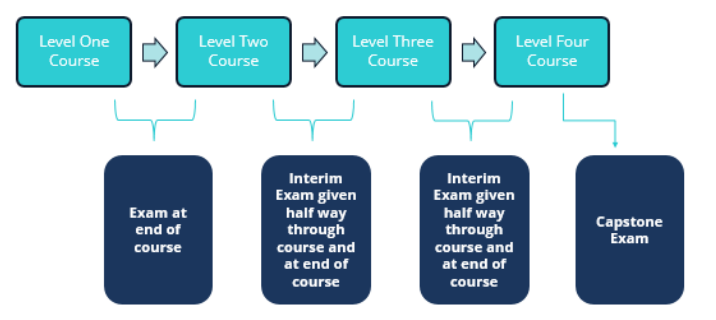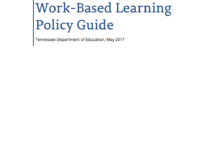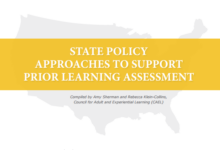Beginning in 2012-13 school year, the Tennessee Department of Education overhauled the state’s Career Technical Education (CTE) standards (which are organized into courses), bringing them into alignment with the newly adopted K-12 standards and embedding the standards within full and rigorous programs of study. This process took place over three multi-step phases.
Phase I began with moving away from seven program areas and reorganizing all state-approved courses and programs around the 16 nationally-recognized Career Clusters®. The state Department of Education then began a review of all existing CTE courses and programs of study, with a focus on the skills and knowledge needed for specific pathway courses. Through the review, the Department of Education engaged a variety of stakeholders, including teachers and postsecondary leaders, and included in-depth reviews of labor market information. In total, 139 duplicative programs of study were identified — such as multiple courses aligned with an industry not in demand within a specific region — and 100 courses were retired during this phase.
Phase II of the revision focused on creating new and revising existing courses so that they aligned with the state’s K-12 standards. The state adopted 117 courses in the 2014-15 school year in a process that examined academic rigor, labor market data, and input from teachers, postsecondary and business leaders. The Department of Education formed cluster-specific industry advisory councils to review the new standards and courses.
The state CTE course standards in Tennessee are now all:
- Embedded within full programs of study, within a sequence of at least three courses;
- Internationally competitive based on alignment with postsecondary courses and entry-level jobs in related career areas;
- Clearly written and demanding, allowing teachers the time and flexibility to teach and explore critical topics using meaningful, project-based methodologies; and
- Centered around skill-building exercises that foster employability skills such as critical thinking, problem-solving and teamwork.
 |
|
Tennessee’s CTE assessment sequence, retrieved from the Tennessee Department of Education
|
Phase III of the revision involves developing a system to assess learning throughout the program of study. The purpose of the assessments is to ensure students are mastering course content and to provide instructors with useful information to adjust their teaching strategies. Tennessee started piloting this phase during the 2017-18 school year, starting with the Horticulture Science and Mechatronics programs of study. Tennessee’s approach includes assessments at four points: an end-of-course exam at the conclusion of a level one course, interim exams given halfway through the year and at the end of the year for level two and three courses, and a capstone exam given at the completion of a level four capstone course. Depending on the nature of the capstone course, the final exam could be a portfolio, capstone work-based learning experience, industry certification or early postsecondary opportunity.
Policy in Action
Tennessee’s CTE programs of study are subject to an annual justification process to ensure they are aligned with industry demand, reflect relevant industry competencies, and are connected to postsecondary opportunities. Adjustments are made to programs of study and course content to address gaps as a result of the review. These changes are published annually for all Career Clusters along with a complete list of state-approved programs of study.
The state is still in the process of developing and implementing assessments for CTE in other programs of study, but implementation will likely involve a similar level of engagement with cluster-specific advisory councils and other key stakeholders. In particular, the Department of Education plans to work with the Tennessee Board of Regents Community Colleges system to create an alignment map listing the secondary programs of study and their alignment to postsecondary programs at community college campuses, including industry certifications and the locations of the programs.
The Department of Education will pay close attention to student outcomes under this new course system to determine effectiveness and make changes as necessary, but it is difficult to measure the impact of these changes this soon. The state mentions the increases in student achievement seen after its adoption of more rigorous K-12 standards as a predictor of how these CTE standards will have a positive impact.
Related Links
- Resource: Tennessee Department of Education: Program of Study Justification Process
- Resource: Tennessee Department of Education: 2020-21 Programs of Study
- Resource: Advance CTE: Raising the Bar: State Strategies for Developing and Approving High-quality Career Pathways (2017)
Last Updated July 2021




